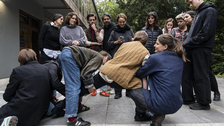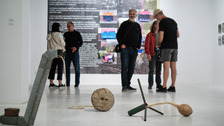Artistic Ecologies - NEW COMPASSES, TOOLS AND ALLIANCES
Project description
Artistic Ecologies: New Compasses, Tools and Alliances is a two-year collaborative project organised between WHW, Zagreb the Rijksakademie van beeldende kunsten, Amsterdam, and Neue Nachbarschaft/Moabit, Berlin. Focused on artistic ecologies and eco-social practices, the project consists of an intersection of three residency and educational programmes: WHW Akademija, Rijksakademie van beeldende kunsten and Moabit Mountain College, run by the partners. Through an exchange between these three programs, the project includes seminars, lectures, workshops, study groups, art residencies, exhibitions and International Degrowth conference with a common goal to promote new eco-social alliances. Artistic Ecologies: New Compasses, Tools and Alliances is addressing that the ‘growth model’ that our current society is based on is deeply damaged and instead of pushing for bigger and better productions, organizations in culture now need to prioritize programs that are more sustainable. This might be the last moment to stop, rethink and replan our future and engage all available resources towards social and environmental transformation. Through art residencies, seminars, conference, radio podcasts, lectures, workshops, and collaborations with various groups and eco-social activists, the project creates sites for sharing sustainable methodologies. The program is developed through three loose thematic threads: Artistic Ecologies, Rooted Communities and Collective Learning and Education in Culture. (1) Artistic Ecologies explores art as an eco-social practice and artists’ engagement with their social and ecological environments. (2) Rooted Communities initiates relations between partner’s educational and cultural programs with wide network of independent non-art organizations and their local communities to promote social inclusion and integration of minorities. (3) Collective Learning and Education in Culture create collective learning processes as places for dialogue, collective learning and imagination.
Objective
- Transnational creation and circulation
Priorities
- Sustainability

